The modern dating landscape is filled with new terminology for non-traditional relationships, situationships and friends with benefits (or a FWB relationship) being two of them. If you are not caught up with such trends, it may be difficult to understand what both these relationships mean. In fact, even a person familiar with these terms may not be able to differentiate between a situationship vs friends with benefits.
So, here we’ve curated the answers to questions such as ‘what is a situationship?’, ‘what is friends with benefits meaning?, and ‘what is the difference between situationship and friends with benefits?’.
What Is A Situationship
Table of Contents
A situationship is a type of relationship with no clear definition. No official commitment is made in this arrangement.
The couple may go on dates, get intimate, and do other couple activities, but the relationship is not given any name. They are not exclusively dating, but it is clear that they are more than friends. So if you’re not sure about your relationship status and find yourself wondering, “Am I in a situationship?”, you probably are.
Most often than not, this ambiguity ends up hurting one of the participants of the relationship. When the relationship boundaries are not defined, one person eventually develops greater expectations and feelings than the other person, and ends up getting disappointed.
Situationship rules
Now that we’ve established that there is a lot of ambiguity in situationships, here are some situationship rules you should know about when considering such a relationship.
- Keep it casual: Don’t get too invested in a no-label relationship
- Prioritize your needs: Don’t put in as much as efforts as you would in a committed relationship
- Communicate with your partner: Whenever you feel like your needs are not being fulfilled, have a conversation
- Respect is a must: Just because the relationship isn’t official, don’t let your partner treat you poorly
Related Reading: 21 Signs Of Lack Of Respect In A Relationship
- Focus on other aspects of your life as well: A situationship is most often just a fleeting connection. Treat it that way — Don’t make it the center of your universe
- See other people: If it is not an exclusivity relationship, you are allowed to explore other options without feeling guilty
- Don’t ask, don’t tell: Your partner doesn’t need to know who you are seeing and vice versa
Related Reading: What Does It Mean When Someone Says They Are Looking For ‘Something Casual’?
What Are Friends With Benefits
Now let’s discuss friends with benefits meaning. In an FWB relationship, the participants view themselves as just friends, with the exception of being physically intimate with one another. Similar to a situationship, there is no commitment between them. They may enjoy spending time together but not in a romantic way.

People opt for a friends with benefits arrangement for different reasons, such as:
- They may want to explore their sexuality in a safer environment
- Being intimate with a known friend to fulfill one’s sexual desires may feel safer than hooking up with a total stranger
- They are attracted to a friend physically but not romantically
- They are hoping that the friends with benefits relationship will evolve into something more
Related Reading: 20 Signs He Wants To Be More Than Friends
Friends with benefits rules
Now that we’ve discussed what is a FWB, it is clear that despite being more defined than a situationship, it is still a difficult terrain to navigate. Similar to the situationship rules, we’ve curated these friends with benefits rules to help you protect yourself:
- Select the right partner. Go for someone who arouses you physically but you don’t feel an intense emotional connection to them.
- Set clear boundaries: Be aware of each other’s expectations before you enter a friends with benefits relationship
- Limit any form of emotional vulnerability to a minimum, lest you develop any unwanted feelings
- Protection is a must: STIs don’t care if your relationship is official or not
- Avoid sleepovers: Having pillow talk is a slippery slope, and getting breakfast together is definitely a couple activity
- Explore your fantasies: It’s a no judgment zone, make the most of it! (with consent, of course)
Situationship Vs Friends With Benefits: Similarities
Situationship vs friends with benefits can be difficult to differentiate sometimes. This is because, despite being different types of relationships, they do display some similarities. Here are some examples:
Casual relationships
Situationships and FWBs are both casual relationships where no commitment or romance is involved. This Reddit post asked people what casual relationships meant to them and these are some features that were commonly answered:
- No commitment
- Short-term
- Not necessarily monogamous
- Less frequent dates than one would expect in a committed relationship
- Not introducing your partner to friends and family as it’s not a serious relationship
Of course, the terms of the relationship could differ from person to person, but these are some commonly seen characteristics of casual relationships.
Related Reading: The Complete Guide To “We Act Like A Couple But We Are Not Official” Situation
Physical intimacy
Both these relationships include physical aspects. FWBs are mainly only sexual, as is clear in the name. These partners are no more than friends in the emotional sense.
Similarly most situationships also involve physical intimacy. There may or may not be an emotional connection but the most, if not all, situationships contain some form of sexual activities.
No future plans
In both situationships and friends with benefits, the participants prioritize enjoying the moment rather than planning a future together. They follow a “Go-with-the-flow” mindset.
Both these relationships don’t involve any expectations of a long-term commitment such as living together or getting married. In fact, most people choose casual relationships precisely because there is no pressure to commit.
Related Reading: Understanding The Dynamics Of Short-Term Relationships
Ambiguity and potential heartbreak
We’ve already discussed how situationships are ambiguous. The lack of boundaries and communication makes situationships a guessing game for both the partners, resulting in a lot of confusion.
Even FWBs, if boundaries are not clearly set, can lead to miscommunication and unfulfilled expectations. Thus, both these relationships can lead to heartbreak if one of the partners ends up developing feelings for the other.
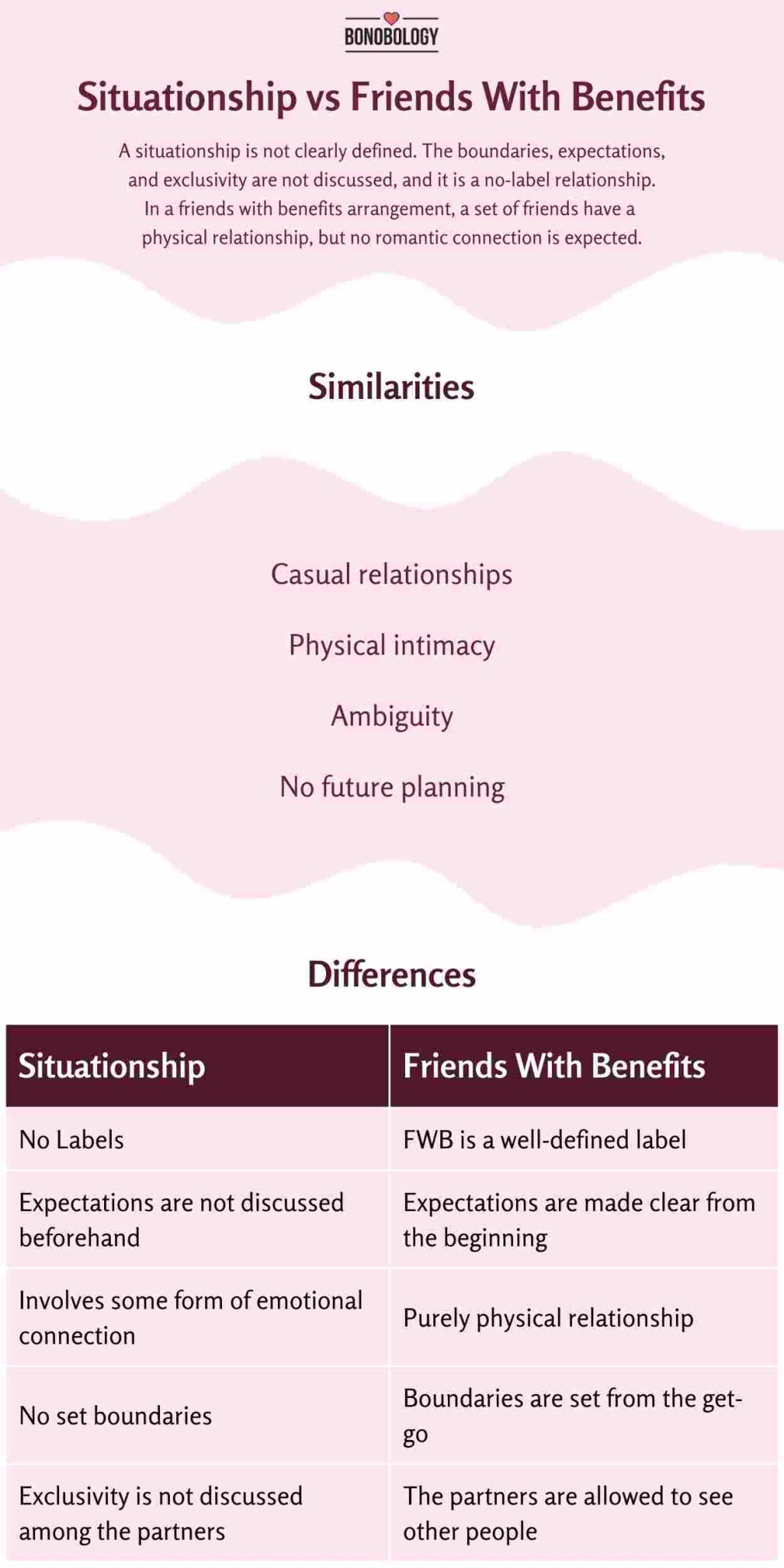
Situationship Vs Friends With Benefits: Differences
In a situationship, the only definite factor is that the partners are more than friends. No other element is defined. You may go on dates, do other couple activities, cuddle or even have sex. Each situationship could be different.
The problem is that these elements are not even discussed between the partners. Thus, while one partner may be content with some casual flirting and occasional dates, the other may be expecting more.
On the other hand, friends with benefits meaning is well-defined. Both the partners know what they want from the relationship and have communicated it with the other person. Let’s discuss the difference between situationship and friends with benefits.
Related Reading: 10 Signs Your Relationship Is Just A Fling & Nothing More
Labels
The major difference between situationships and FWBs is that unlike situationships, FWBs put a label on their relationship. The answer to ‘what is a FWB’ is clear and well-defined — it is clear that you want to remain friends with the added benefit of physical intimacy.
On the other hand, one of the major situationship red flags is that they are ambiguous and sometimes people don’t even know that they are in one, because there is no label given to their relationship.
Expectations from each other
Another key difference is the clarity of expectations. In a friends with benefits relationship, both partners often understand what is being expected of them in the relationship. In a situationship, however, expectations are often unclear since they are never discussed in the first place.
For example, my coworker, Ashley, was in a situationship with a guy, who didn’t ask her out on dates. It made her upset all the time that he would directly ask her for hookups without planning any sort of date or activity together. She couldn’t ask him though, as they had not made any commitment and thus, had no obligations to each other.
When encouraged by friends, she finally had a conversation with him. Turns out he was viewing it as only a sexual relationship and thought Ashley did the same. As you may have guessed, things did not end well.
Related Reading: Expectations In Relationships: The Right Way To Manage Them
Emotional connection
A FWB arrangement is purely physical. Both parties agree from the beginning to keep things casual and make no room for any emotional connection. On the contrary, if you’re asking yourself, “Am I in a situationship?” chances are that you are feeling some form of deep emotional connection and possibly romantic feelings. These feelings make things more complicated. especially if one-sided.

Boundaries
Continuing the theme of clarity, A FWB arrangement often includes clear boundaries set in the beginning of the relationship, such as the frequency of physical intimacy, whether to make the relationship public, and maybe a set duration for the relationship as well.
On the other hand, situationships mostly operate on the go-with-the-flow basis, leaving a lot of factors undefined. This is one of the situationship red flags that make the participants miserable. It leads to a “Will we, won’t we” conundrum for the one that develops feelings.
Exclusivity
In most FWB arrangements, the partners allow each other to see other people, as their relationship is purely physical and no emotional commitment is made. However, a situationship, being undefined, makes it difficult for the partner to determine if there is a commitment or not as they’ve not discussed it among themselves.
Key Pointers
- Situationships are relationships with lot of undefined elements; they have no label, and exclusivity and expectations are not discussed between the partners
- Friends with benefits relationships often have well-defined boundaries
- FWB relationships are purely physical and include no deep emotional connection
- Nevertheless, both relationships contain a risk of developing feelings and getting your heart broken
Final Thoughts
While situationships and friends with benefits are similar in some aspects, they are different in many ways. A FWB arrangement is well-defined, with set boundaries and expectations. A situationship, however, is ambiguous in these matters. Nevertheless, whether dealing with a FWB or a situationship, one needs to be careful and avoid developing an emotional attachment.
Your contribution does not constitute a charitable donation. It will allow Bonobology to continue bringing you new and up-to-date information in our pursuit of helping anyone in the world to learn how to do anything.





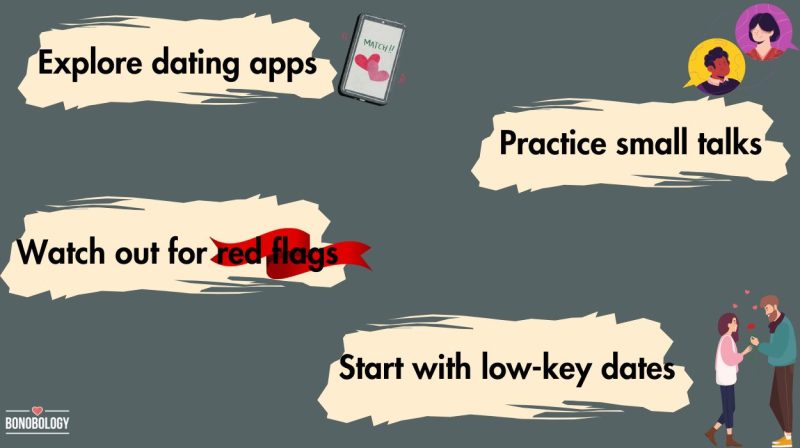


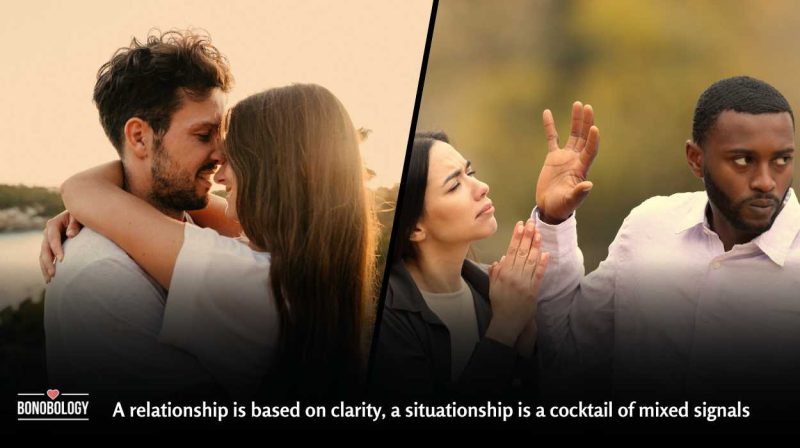



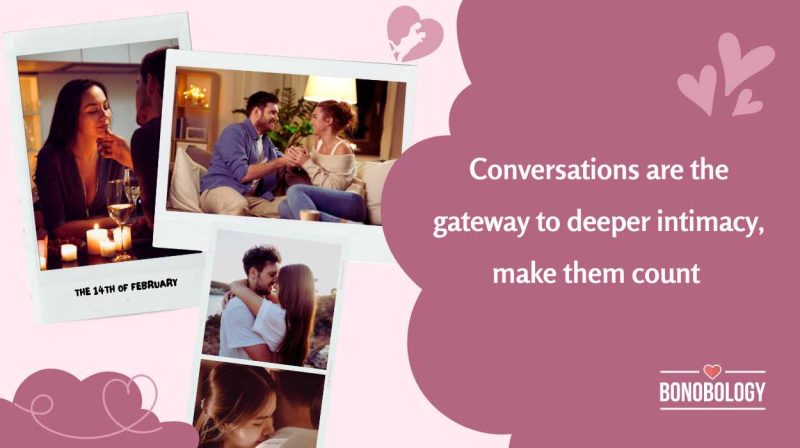



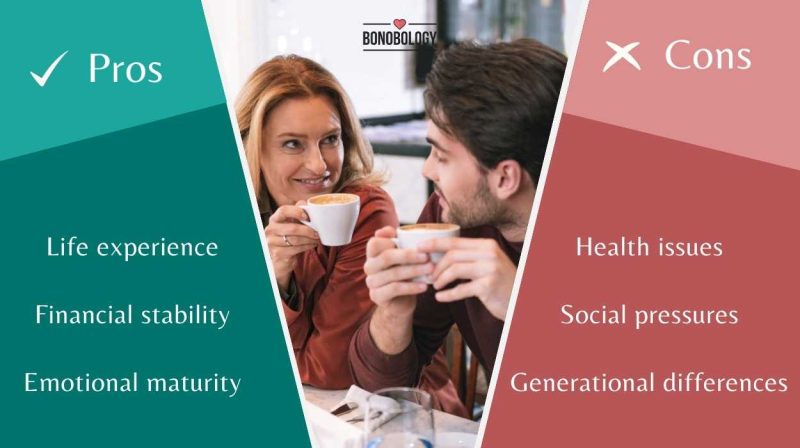





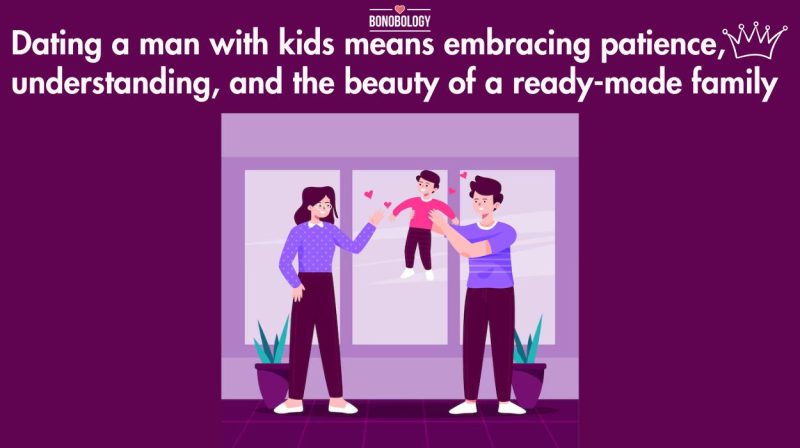
Featured
Jawline Fillers And Masculinity—Redefining Attraction In Modern Relationships
125 пикантных вопросов, которые стоит задать своему парню
How To Start Dating: Tips For Beginners & Those Starting Again
25 Bedtime Stories For Girlfriend
From Self-Awareness To Compatibility: Digital Twins For Modern Relationships
Situationship Vs Relationship: Can One Lead To The Other?
How To Get A Guy To Like You: 20 Simple Techniques, No Mind Games
The Significant Difference Between Love You And I Love You
125 Spicy Questions To Ask Your Boyfriend
125 Deep Questions To Ask Your Boyfriend To Truly Understand Him
Balancing Love And Learning: How Online Degrees Can Strengthen Relationships
What Is A Power Couple? 15 Signs You And Your Partner Are One
What Is The Role Of A Husband In A Modern Relationship?
Marrying An Older Woman: Pros And Cons, And How To Make It Work
Everything You Need To Know About Transactional Relationships
Premarital Counseling – 12 Reasons You Should Opt For It
Living Apart Together: Decoding The Latest Trend Said To Save Relationships
Domestic Partnership vs Marriage: Difference & Benefits
Marrying For Money: Is It The Right Choice For You And How To Make It Work?
21 Things To Know About Dating A Man With Kids